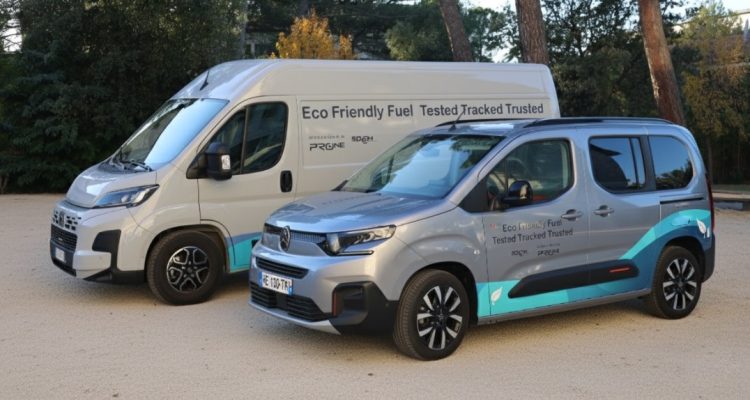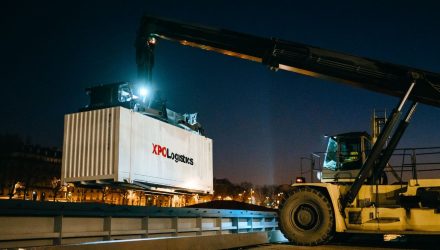Stellantis has launched the HVO Aurora initiative, a month-long European road tour designed to demonstrate how Hydrotreated Vegetable Oil (HVO) can deliver meaningful CO₂ reductions in existing light commercial vehicles. Two models have been selected for the trial – a Citroën Berlingo and a Fiat Professional Ducato – both running solely on HVO to gather accurate, real-world performance and emissions data. The project reflects Stellantis’ commitment to practical decarbonisation and showcases the potential for renewable fuels to support fleet sustainability immediately, rather than years into the future.
Hydrotreated Vegetable Oil is a renewable paraffinic diesel alternative produced from waste oils such as used cooking oil and residual animal fats. Its appeal lies in its ability to offer up to 85–90% lifecycle CO₂ savings, depending on feedstock and production methods. Because HVO meets the EN 15940 standard, it is fully compatible with many diesel engines on the road today, which allows businesses to decarbonise without investing in new vehicles or overhauling their infrastructure. With a high cetane number, HVO promotes cleaner combustion and reduced particulate output, while its long shelf life makes it suitable for fleet operators who require stable fuel storage without degradation concerns.
Stellantis has partnered with SP3H to equip each van with FluidBox Micro sensors, enabling transparent digital monitoring throughout the entire trial. These sensors continuously analyse fuel composition, consumption patterns, distance covered, and estimated CO₂ savings, transmitting the data to a cloud platform for processing. The use of these onboard diagnostic sensors ensures that every kilometre travelled and every litre of fuel consumed is verifiable, giving fleet managers precise insights into the environmental benefits of running their vans on renewable HVO.
Crucially, the participating vans are entirely unmodified. This demonstrates that HVO can be adopted immediately within existing fleets without the need for new hardware, engine recalibration, or infrastructure upgrades. In practice, this means operators can introduce renewable fuels at scale, with minimal operational disruption and no capital expenditure. Across Europe, this could allow fleet managers to make swift progress toward corporate and regulatory sustainability commitments.
The HVO Aurora project places significant emphasis on transparent measurement and carbon accounting. Because the SP3H sensors validate exactly what fuel is being used and how it impacts performance, Stellantis is able to produce reliable, real-time reports on emissions reductions. For many organisations, this level of traceability is increasingly important. Carbon reduction claims must now be substantiated with credible evidence, and renewable fuel usage must be certifiable if it is to contribute to corporate ESG reporting or Scope 1 emissions reductions. The data generated during the Aurora trial therefore becomes more than an engineering insight—it becomes a practical tool for sustainability governance.
The implications for fleet operators are significant. HVO provides a route to immediate carbon reduction without replacing vehicles or adopting new fuelling systems. For businesses operating large diesel fleets, HVO offers a transition technology that is simpler and more manageable than a sudden switch to electric or hydrogen mobility. Using a fuel that is chemically stable, easy to store, and compatible with existing engines also reduces operational risk. HVO’s cleaner combustion properties may decrease soot production and extend the life of aftertreatment systems, potentially lowering maintenance costs.
In an environment where regulations on emissions are becoming increasingly strict, the ability to decarbonise quickly and credibly is a commercial advantage. By adopting renewable fuels, fleets can demonstrate responsible environmental performance to customers, regulators, and investors. Verified data from trials like HVO Aurora strengthens this position by providing transparent evidence that reductions are genuine and measurable.
Although the benefits are substantial, several factors must be considered when scaling up the use of HVO. The environmental impact depends heavily on sourcing sustainable feedstocks; waste-derived inputs offer the strongest carbon savings, while virgin crops may introduce broader sustainability questions. Availability remains uneven across Europe, and pricing can vary depending on supply and regional incentives. Nevertheless, the growing investment in renewable fuels and the increasing pressure to cut emissions mean that supply is expected to expand rapidly.
Certification is another key priority. Responsible procurement is essential to ensuring that biofuels deliver the emissions savings they promise. The emphasis Stellantis places on traceability through sensor-based monitoring highlights the importance of transparency as the renewable fuels market matures.
The HVO Aurora trial forms part of Stellantis’ wider strategy to accelerate decarbonisation through practical, scalable solutions. Emerging from the Stellantis Star*Up innovation programme, the project allows the company to explore renewable fuel deployment at fleet level with the kind of detailed data that policymakers, businesses, and industry bodies now expect. By enabling users to track, verify, and report sustainable fuel use, Stellantis is demonstrating that decarbonisation need not rely solely on electrification; it can also be achieved by enhancing the sustainability of the existing fleet.
Should the results of this trial confirm the anticipated emissions reductions, the HVO Aurora project could become a catalyst for widespread adoption of renewable fuels across the European light commercial vehicle sector. With corporate net-zero commitments intensifying and infrastructure for electric alternatives still uneven, HVO is emerging as a strong transitional technology for fleets seeking immediate impact. The data-driven approach demonstrated by Stellantis and SP3H offers a blueprint for how renewable fuel usage can be monitored, certified, and integrated into long-term sustainability reporting.
The Stellantis HVO Aurora trial represents a meaningful step toward practical, immediate decarbonisation for commercial van fleets. By demonstrating that renewable fuels can be deployed effectively in existing vehicles and supported with transparent, certifiable data, Stellantis is offering fleets a credible pathway to reduce emissions today. For operators seeking fast, measurable progress on sustainability, HVO presents a compelling opportunity—one that the HVO Aurora initiative is set to strengthen significantly.
Luca Marengo, Head of Product and Innovation for Stellantis Pro One, said: “HVO Aurora shows how we can reduce well-to-wheel emissions immediately, using solutions that work with the vehicles our customers already rely on.
“At Stellantis Pro One, we remain committed to providing practical and scalable ways to help businesses reduce full cycle emissions now.
“This project is a concrete step forward in building a cleaner future for mobility in Europe.”






